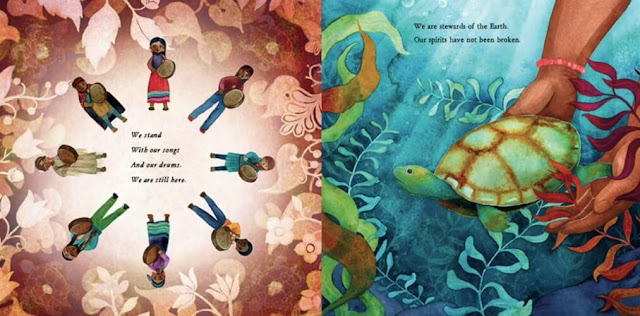Disclosure:
Affiliate links
to Amazon are included in this post.
Author's Summary
Water is the first medicine.
It affects and connects us all...
Inspired by the many Indigenous-led movements across North America, We Are Water Protectors issues an urgent rallying cry to safeguard the Earth’s water from harm and corruption—a bold and lyrical picture book written by Carole Lindstrom and vibrantly illustrated by Michaela Goade.
When a black snake threatens to destroy the Earth
And poison her people’s water, one young water protector
Takes a stand to defend Earth’s most sacred resource.
🍎 Title:
We Are Water Protectors
🍎Author: Carole Lindstrom
🍎Illustrator: Michaela Goade
🍎Publisher: Roaring Book Press
🍎Date: March 17, 2020
Social Studies Minilesson #1: We Are Still Here
We Are Water Protectors is a children's book inspired by real people
and real events. Throughout the book, we see the words
we are still here repeated several times. When reading
We Are Water Protectors with your students and children, draw their
attention to these words. Why does the author say
we are still here over and over? What message is the author sending
us? What does she want us to know?
...We stand
With our songs
And our drums.
We are still here...
The message is simple. Indigenous people... also known as Native Americans
in the United States or First Nations in Canada... are still very much alive
and are active in our communities. Too often history books mislead children
into thinking that the Indigenous cultures are things of the past... similar
to the way the cultures of the ancient Egyptians, ancient Greeks, or ancient
Mesopotamians are a thing of the past. While reading
We Are Water Protectors, smash that misconception. Emphasize to your
students that Indigenous people, tribes, and nations are still here.

Social Studies Minilesson #2: Geography
Author Carole Lindstrom is Anishinabe/Metis and is tribally enrolled with the Turtle Mountain Band of Ojibwe. She was born and raised in Nebraska and currently lives in Maryland. Illustrator Michaela Goade is an enrolled member of the Tlingit & Haida Indian Tribes and currently lives in Alaska.
Pull out a map of North America. What city, state, and country do you and your
students live in? Help your students find them on the map. When you are done,
work together to find Nebraska, Maryland, and Alaska. How far away are they
from where your students live? What interesting landmarks, bodies of water,
and landforms do you see on the map? What are the state capitals? What else
can you learn from the map?


Social Studies Minilesson #3: Building Connections to Current Events
Environmental protests similar to the one led by the Standing Rock Sioux in North Dakota are the inspiration for We Are Water Protectors. In 2016, the U.S. Army Corps of Engineers approved a plan to build an oil pipeline (Dakota Access Pipeline... also known as DAPL) from North Dakota, through South Dakota and Iowa, to Illinois. They claimed that building the pipeline would pose no threat to the environment, to communities, or to historical/cultural landmarks.
What the U.S. Army Corps of Engineers failed to mention is that the pipeline
would run directly under Lake Oahe... the primary source of water for the
people living on the Standing Rock Sioux reservation. They also failed to
mention that the construction of the pipeline would damage culturally sacred
sites on the reservation... a significant violation of the existing treaties
between the people of Standing Rock and the United States government.

Later that year, the citizens of Standing Rock and their supporters gathered
in protest of the broken treaties and the potential risk to their drinking
water and sacred sites. This protest lasted from April 2016 to February 2017.
The Dakota Access Pipeline was completed in April 2017 and became fully
operational two months later. There were at least five documented oil leaks in
the pipeline in 2017 alone. More leaks and spills have occurred since then.
Use the map again to find North Dakota, South Dakota, Iowa, Illinois, Lake
Oahe, and the Standing Rock Sioux Reservation.

When reading We Are Water Protectors with your children and students,
talk about the Dakota Access Pipeline... what it is, why the U.S. Army Corps
of Engineers wanted to build it, the problems it caused, and the potential
problems it can cause in the future. Ask about the black snake that
was in the story. How does that black snake symbolize the pipeline? What
does the snake's poison represent? The people in the story were going to
fight the black snake. How did the people fight the black snake in
real life? Even though the pipeline was built, do your students think the
people of Standing Rock have stopped fighting the black snake? Is the fight
against the black snake truly over?

#waterislife #noDAPL #standwithstandingrock
So very kind of you. Chi miigwech for your lovely review. 💙
— Carole Lindstrom 🧡 (@CaroleLindstrom) November 4, 2021

Did you enjoy reading about We Are Water Protectors? If so, check
out these blog posts about related topics:
- Book + Craft: Over and Under the Snow by Kate Messner
- Book List: 10 Children's Books About Residential Schools
- Book + Craft: One Plastic Bag: Isatou Ceesay and the Recycling Women of the Gambia by Miranda Paul
- Book + Printable: Watch Over Our Water by Lisa Bullard
- Book: Saving Planet Earthly by ClimateScience
- Book: Red Bird Sings: The Story of Zitkala-Ša by Gina Capaldi and Q.L. Pearce
search words: Water is life, water, water cycle, Indigenous Peoples, Native American, First Peoples, Indians, pollution, environmental stewardship, protecting the environment, ecology, Earth Day


